【核心素养目标】Unit 1 Where did you go on vacation Section B 2a-2e 导学案
文档属性
| 名称 | 【核心素养目标】Unit 1 Where did you go on vacation Section B 2a-2e 导学案 | 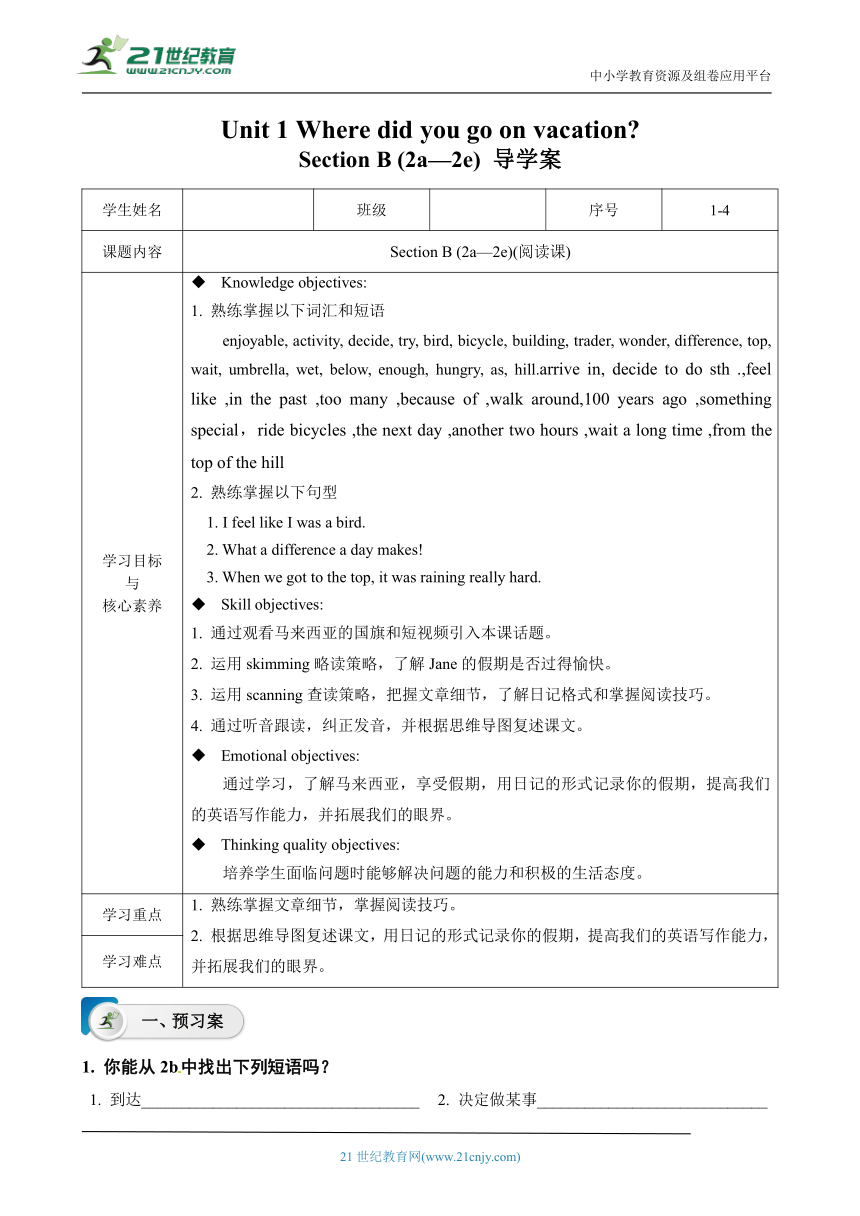 | |
| 格式 | docx | ||
| 文件大小 | 1.4MB | ||
| 资源类型 | 试卷 | ||
| 版本资源 | 人教新目标(Go for it)版 | ||
| 科目 | 英语 | ||
| 更新时间 | 2022-08-16 08:43:46 | ||
图片预览

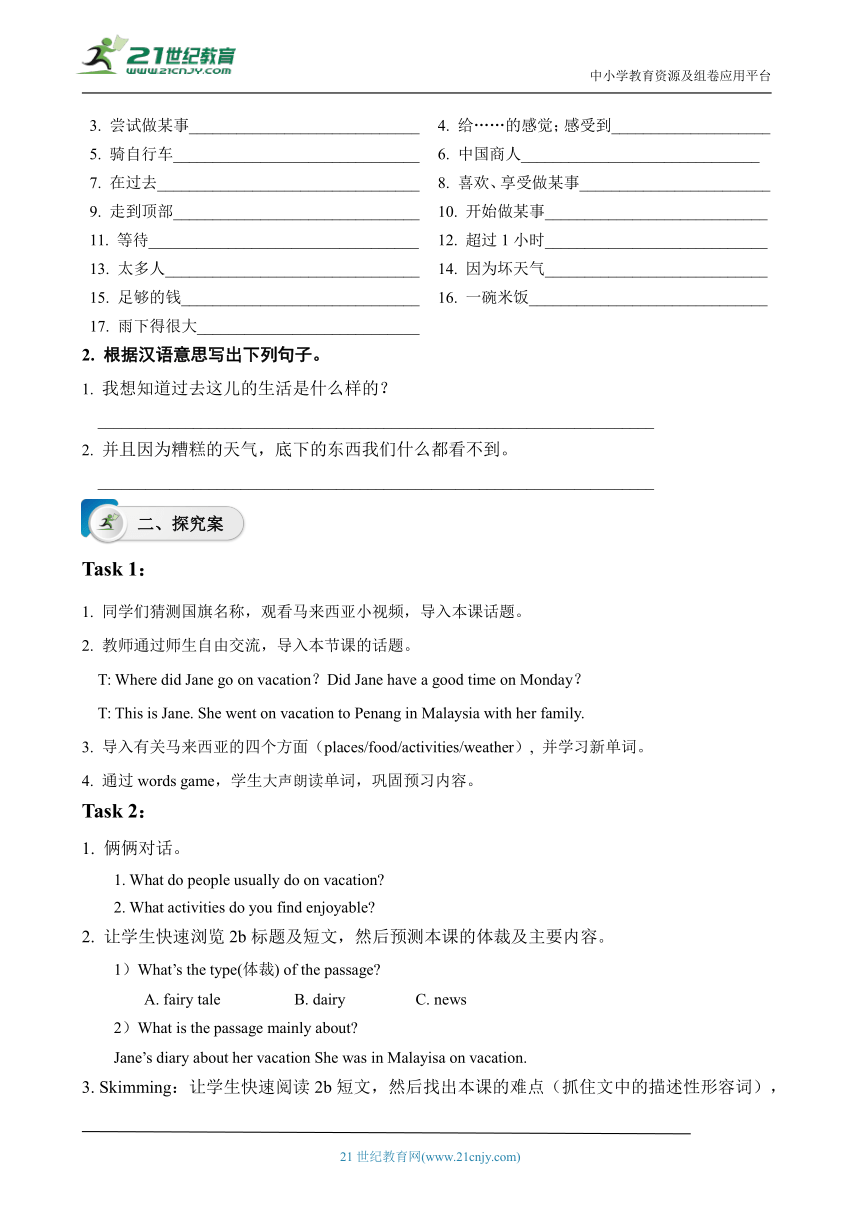
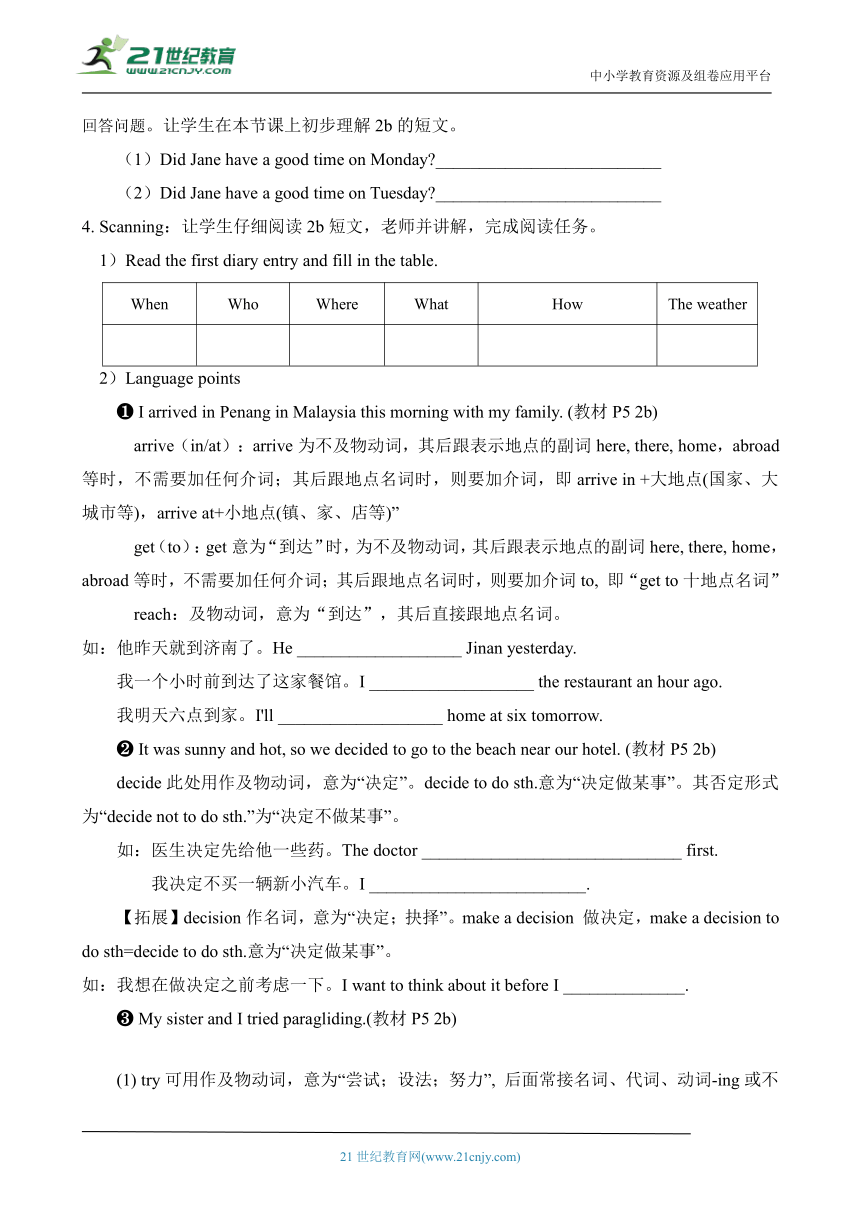
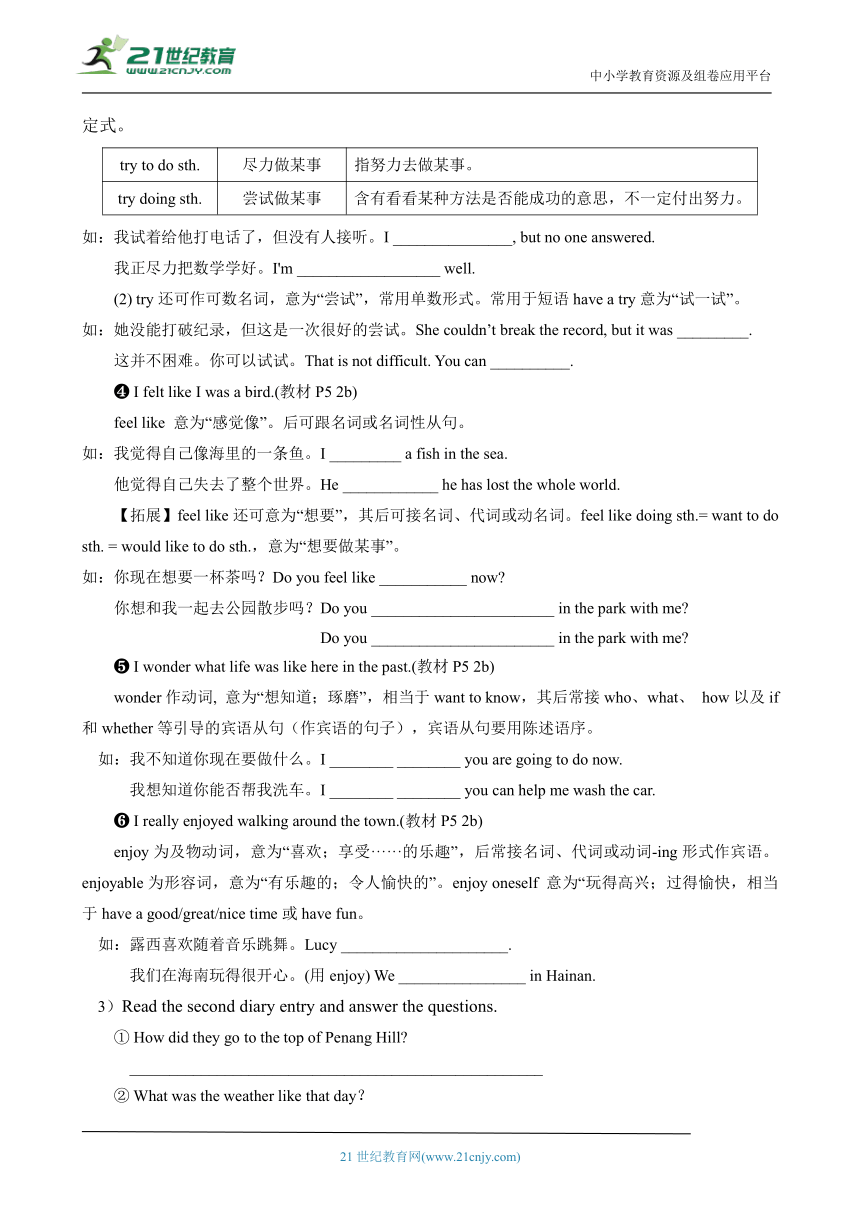
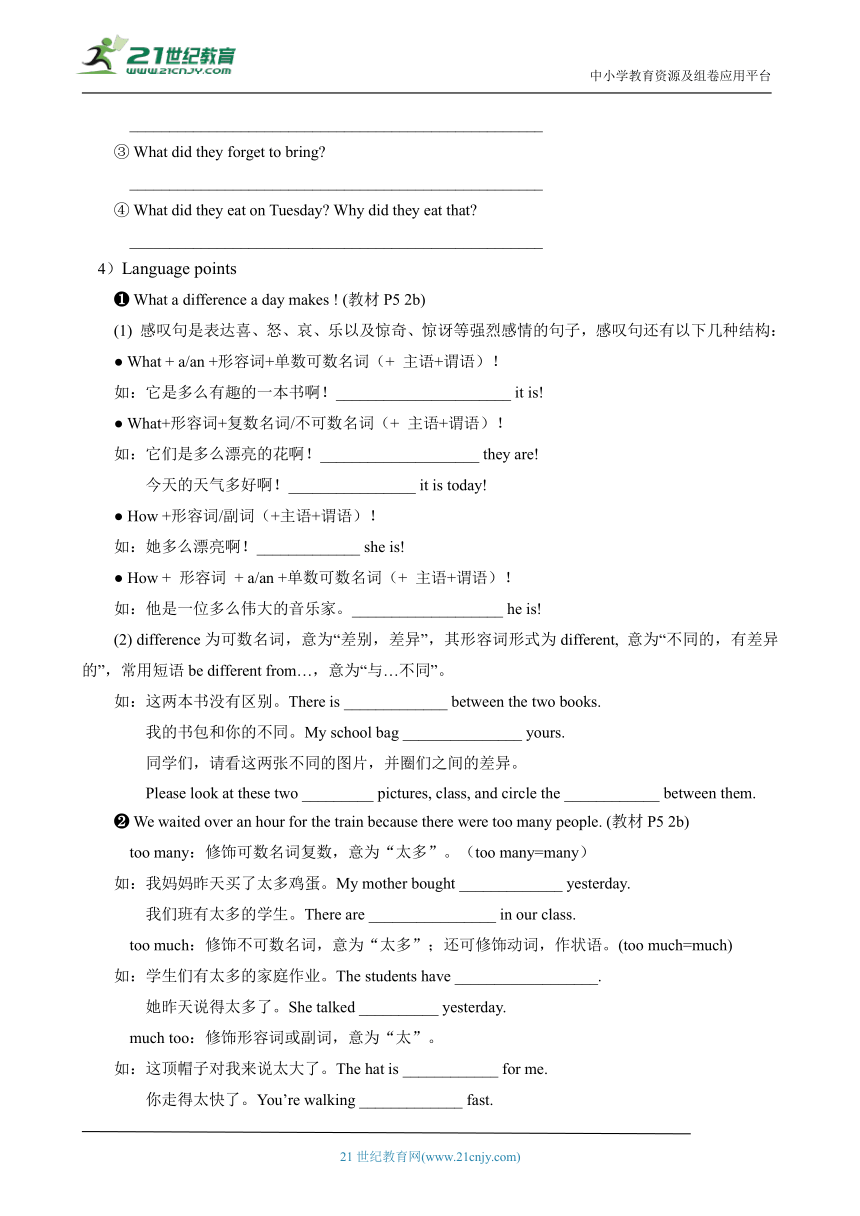
文档简介
中小学教育资源及组卷应用平台
Unit 1 Where did you go on vacation
Section B (2a—2e) 导学案
学生姓名 班级 序号 1-4
课题内容 Section B (2a—2e)(阅读课)
学习目标 与 核心素养 Knowledge objectives: 1. 熟练掌握以下词汇和短语 enjoyable, activity, decide, try, bird, bicycle, building, trader, wonder, difference, top, wait, umbrella, wet, below, enough, hungry, as, hill.arrive in, decide to do sth .,feel like ,in the past ,too many ,because of ,walk around,100 years ago ,something special,ride bicycles ,the next day ,another two hours ,wait a long time ,from the top of the hill 2. 熟练掌握以下句型 1. I feel like I was a bird. 2. What a difference a day makes! 3. When we got to the top, it was raining really hard. Skill objectives: 1. 通过观看马来西亚的国旗和短视频引入本课话题。 2. 运用skimming略读策略,了解Jane的假期是否过得愉快。 3. 运用scanning查读策略,把握文章细节,了解日记格式和掌握阅读技巧。 4. 通过听音跟读,纠正发音,并根据思维导图复述课文。 Emotional objectives: 通过学习,了解马来西亚,享受假期,用日记的形式记录你的假期,提高我们的英语写作能力,并拓展我们的眼界。 Thinking quality objectives: 培养学生面临问题时能够解决问题的能力和积极的生活态度。
学习重点 熟练掌握文章细节,掌握阅读技巧。 根据思维导图复述课文,用日记的形式记录你的假期,提高我们的英语写作能力,并拓展我们的眼界。
学习难点
1. 你能从2b中找出下列短语吗?
到达___________________________________ 决定做某事_____________________________
尝试做某事_____________________________ 给……的感觉;感受到____________________
骑自行车_______________________________ 中国商人______________________________
在过去_________________________________ 喜欢、享受做某事________________________
走到顶部_______________________________ 开始做某事____________________________
等待__________________________________ 超过1小时____________________________
太多人________________________________ 因为坏天气____________________________
足够的钱______________________________ 一碗米饭______________________________
雨下得很大____________________________
根据汉语意思写出下列句子。
我想知道过去这儿的生活是什么样的?
______________________________________________________________________
并且因为糟糕的天气,底下的东西我们什么都看不到。
______________________________________________________________________
Task 1:
1. 同学们猜测国旗名称,观看马来西亚小视频,导入本课话题。
2. 教师通过师生自由交流,导入本节课的话题。
T: Where did Jane go on vacation?Did Jane have a good time on Monday?
T: This is Jane. She went on vacation to Penang in Malaysia with her family.
导入有关马来西亚的四个方面(places/food/activities/weather), 并学习新单词。
通过words game,学生大声朗读单词,巩固预习内容。
Task 2:
俩俩对话。
1. What do people usually do on vacation
2. What activities do you find enjoyable
2. 让学生快速浏览2b标题及短文,然后预测本课的体裁及主要内容。
1)What’s the type(体裁) of the passage
A. fairy tale B. dairy C. news
2)What is the passage mainly about
Jane’s diary about her vacation She was in Malayisa on vacation.
3. Skimming:让学生快速阅读2b短文,然后找出本课的难点(抓住文中的描述性形容词),回答问题。让学生在本节课上初步理解2b的短文。
(1)Did Jane have a good time on Monday __________________________
(2)Did Jane have a good time on Tuesday __________________________
4. Scanning:让学生仔细阅读2b短文,老师并讲解,完成阅读任务。
1)Read the first diary entry and fill in the table.
When Who Where What How The weather
2)Language points
I arrived in Penang in Malaysia this morning with my family. (教材P5 2b)
arrive(in/at):arrive为不及物动词,其后跟表示地点的副词here, there, home,abroad等时,不需要加任何介词;其后跟地点名词时,则要加介词,即arrive in +大地点(国家、大城市等),arrive at+小地点(镇、家、店等)”
get(to):get意为“到达”时,为不及物动词,其后跟表示地点的副词here, there, home,abroad等时,不需要加任何介词;其后跟地点名词时,则要加介词to, 即“get to十地点名词”
reach:及物动词,意为“到达”,其后直接跟地点名词。
如:他昨天就到济南了。He ___________________ Jinan yesterday.
我一个小时前到达了这家餐馆。I ___________________ the restaurant an hour ago.
我明天六点到家。I'll ___________________ home at six tomorrow.
It was sunny and hot, so we decided to go to the beach near our hotel. (教材P5 2b)
decide此处用作及物动词,意为“决定”。decide to do sth.意为“决定做某事”。其否定形式为“decide not to do sth.”为“决定不做某事”。
如:医生决定先给他一些药。The doctor ______________________________ first.
我决定不买一辆新小汽车。I _________________________.
【拓展】decision作名词,意为“决定;抉择”。make a decision 做决定,make a decision to do sth=decide to do sth.意为“决定做某事”。
如:我想在做决定之前考虑一下。I want to think about it before I ______________.
My sister and I tried paragliding.(教材P5 2b)
(1) try可用作及物动词,意为“尝试;设法;努力”, 后面常接名词、代词、动词-ing或不定式。
try to do sth. 尽力做某事 指努力去做某事。
try doing sth. 尝试做某事 含有看看某种方法是否能成功的意思,不一定付出努力。
如:我试着给他打电话了,但没有人接听。I _______________, but no one answered.
我正尽力把数学学好。I'm __________________ well.
(2) try还可作可数名词,意为“尝试”,常用单数形式。常用于短语have a try意为“试一试”。
如:她没能打破纪录,但这是一次很好的尝试。She couldn’t break the record, but it was _________.
这并不困难。你可以试试。That is not difficult. You can __________.
I felt like I was a bird.(教材P5 2b)
feel like 意为“感觉像”。后可跟名词或名词性从句。
如:我觉得自己像海里的一条鱼。I _________ a fish in the sea.
他觉得自己失去了整个世界。He ____________ he has lost the whole world.
【拓展】feel like还可意为“想要”,其后可接名词、代词或动名词。feel like doing sth.= want to do sth. = would like to do sth.,意为“想要做某事”。
如:你现在想要一杯茶吗?Do you feel like ___________ now
你想和我一起去公园散步吗?Do you _______________________ in the park with me
Do you _______________________ in the park with me
I wonder what life was like here in the past.(教材P5 2b)
wonder作动词, 意为“想知道;琢磨”,相当于want to know,其后常接who、what、 how以及if和whether等引导的宾语从句(作宾语的句子),宾语从句要用陈述语序。
如:我不知道你现在要做什么。I ________ ________ you are going to do now.
我想知道你能否帮我洗车。I ________ ________ you can help me wash the car.
I really enjoyed walking around the town.(教材P5 2b)
enjoy为及物动词,意为“喜欢;享受······的乐趣”,后常接名词、代词或动词-ing形式作宾语。enjoyable为形容词,意为“有乐趣的;令人愉快的”。enjoy oneself 意为“玩得高兴;过得愉快,相当于have a good/great/nice time或have fun。
如:露西喜欢随着音乐跳舞。Lucy _____________________.
我们在海南玩得很开心。(用enjoy) We ________________ in Hainan.
3)Read the second diary entry and answer the questions.
① How did they go to the top of Penang Hill
____________________________________________________
② What was the weather like that day?
____________________________________________________
③ What did they forget to bring
____________________________________________________
④ What did they eat on Tuesday Why did they eat that
____________________________________________________
4)Language points
What a difference a day makes ! (教材P5 2b)
(1) 感叹句是表达喜、怒、哀、乐以及惊奇、惊讶等强烈感情的句子,感叹句还有以下几种结构:
● What + a/an +形容词+单数可数名词(+ 主语+谓语)!
如:它是多么有趣的一本书啊!______________________ it is!
● What+形容词+复数名词/不可数名词(+ 主语+谓语)!
如:它们是多么漂亮的花啊!____________________ they are!
今天的天气多好啊!________________ it is today!
● How +形容词/副词(+主语+谓语)!
如:她多么漂亮啊!_____________ she is!
● How + 形容词 + a/an +单数可数名词(+ 主语+谓语)!
如:他是一位多么伟大的音乐家。___________________ he is!
(2) difference为可数名词,意为“差别,差异”,其形容词形式为different, 意为“不同的,有差异的”,常用短语be different from…,意为“与…不同”。
如:这两本书没有区别。There is _____________ between the two books.
我的书包和你的不同。My school bag _______________ yours.
同学们,请看这两张不同的图片,并圈们之间的差异。
Please look at these two _________ pictures, class, and circle the ____________ between them.
We waited over an hour for the train because there were too many people. (教材P5 2b)
too many:修饰可数名词复数,意为“太多”。(too many=many)
如:我妈妈昨天买了太多鸡蛋。My mother bought _____________ yesterday.
我们班有太多的学生。There are ________________ in our class.
too much:修饰不可数名词,意为“太多”;还可修饰动词,作状语。(too much=much)
如:学生们有太多的家庭作业。The students have __________________.
她昨天说得太多了。She talked __________ yesterday.
much too:修饰形容词或副词,意为“太”。
如:这顶帽子对我来说太大了。The hat is ____________ for me.
你走得太快了。You’re walking _____________ fast.
And because of the bad weather, we couldn't see anything below. (教材P5 2b)
【易混辨析】because与because of
because of 介词短语,其后可跟名词(短语)、代词或动名词。
because 连词,意为“因为”引导原因状语从句,表示直接、明确的原因或理由。
如:这个男孩很不开心,因为他没有朋友。The boy is unhappy _________ he has no friends.
我喜欢这个男孩,因为他天性善良。I like the boy ___________ his kind nature.
My father didn’t bring enough money, so we only had one bowl of rice and some fish.(教材P5 2b)
bring作动词,意为“带来”,bring sb./sth. to...意为把某人/某物带到··· bring sb.sth.=bring sth. for sb.意为“为某人带来某物”。
bring 意为“带来;拿来”,指从别处带到说话者所在地。bring sth./sb. to + 地点名词,意为“把某物/某人带到某地”。
take 意为“带走,拿走”,指从说话者所在地带到别处去。take sth./sb. to + 地点名词,意为“带某人/某物去某地”。
如:我能带个朋友来参加聚会吗?Can I _______________ the party
给海伦带个礼物。______________________________.=______________________________.
我们将带学生去博物馆。We’ll _________________ the museum.
My father didn’t bring enough money, so we only had one bowl of rice and some fish.(教材P5 2b)
① 作形容词时,作定语,意为“足够的;充分的”,既可修饰可数名词,也可修饰不可数名词。修饰名词很自由,一般放名词之前,也可放名词之后。
如:我们有足够的维持一周食物。________________________________________
我们有足够的钱买这所房子。________________________________________
② 副词,“足够地;充足地”,修饰形容词或副词,且必须放在它们之后。形容词或副词 + enough to do sth. 足够的……做某事
如:他够上学的年龄了。________________________________
他跑得足够地快。___________________________________
③ 代词,“足够;充分”,一般是在句子里作主语或宾语。
如:我们有足够的事要做。___________________________
5)开心模仿秀,跟读录音注意语音和语调。然后大声朗读。
Task 3:
1. 再次认真阅读日记,根据日记内容完成2c表格。
2. 根据Jane去马来西亚旅行的信息来完成2d中Anna和Jane的对话,完成后集体核对答案。然后两人一组练习对话,并邀请两组学生表演对话。
4. 根据2c、2d,试着复述短文。
5. 大声朗读2e日记,了解日记的写法及一般过去时态的用法。提示学生写日记要用一般过去时。
6. 培养学生面临问题时能够解决问题的能力和积极的生活态度。
1. 根据汉语提示完成下列单词。
Look! There is a nice ___________(鸟) in the tall tree.
John usually rides his ___________(自行车) to school on school days.
I ___________(想知道) who went to the park with you yesterday afternoon.
You can plant some trees on the ___________(顶部) of the mountain.
Don’t forget to take your ___________(雨伞). It may rain in the afternoon.
From the plane we could see the river ___________(在……下面) us looked like a snake.
Susan went out in the rain and got ___________ (湿的).
We don’t have ___________(足够的) food for the week. Let’s go and buy some.
Tina is good at swimming. She can swim ___________(像……一样) a fish.
There are two small ___________(小山) near our school.
2. 用所给单词的适当形式填空。
Miss Lee and her students spent an ___________(enjoy) day in the history museum.
The students have many ___________(activity) after school. They play soccer, play chess or dance.
Jason didn’t like the tall __________(build) or busy streets in the city, so he went back to the countryside last year.
Jenny found a little boy ___________(wait) for his mother under the tree.
There are many ___________(different) between the two cars.
Nancy’s uncle and aunt are ___________(trade).
Jane ___________(try) to call her friend Lucy, but her phone didn’t work.
I’m ___________(hunger) and need to get something to eat.
After having lunch, they ___________(decide) to walk to school yesterday.
In my free time, I really enjoy ___________(walk) around the town.
3. 根据汉语意思完成句子。
我只等了五分钟,但感觉像是几个小时。
I waited only for five minutes, but it ________ ________a few hours.
为什么不尝试乘公共汽车去上班呢
Why not ________ ________a bus to go to work
昨天公园里有太多的人。
There were ________ ________people in the park yesterday.
昨天晚上八点他正在家里看电视。
He ________ ________TV at eight yesterday evening.
我晚饭吃了一碗米饭和一些鸡肉。
I had ________ ________ ________ ________ and some chicken for dinner.
4. 按要求完成下列各题。
She arrived in Beijing last Friday.(改为同义句)
She ________ ________ Beijing last Friday.
Holly's mother made delicious zongzi yesterday.(改为感叹句)
________ ________zongzi Holly's mother made yesterday!
Lisa found nothing in the small room.(改为同义句)
Lisa ________ ________ ________in the small room.
They put off the art festival because it rained heavily.(改为同义句)
They put off the art festival ________ ________ the heavy rain.
I want to know. Where does she come from (合并为一句)
I want to know ________ she ________ ________.
训练案答案
1. 根据汉语提示完成下列单词。
bird bicycle/bike wonder top umbrella
below wet enough as hills
2. 用所给单词的适当形式填空。
enjoyable activities buildings waiting differences
traders tried hungry decided walking
3. 根据汉语意思完成句子。
felt like try taking too many
was watching a bowl of rice
4. 按要求完成下列各题。
got to What delicious didn’t find anything
because of where; comes from
21世纪教育网 www.21cnjy.com 精品试卷·第 2 页 (共 2 页)
21世纪教育网(www.21cnjy.com)
Unit 1 Where did you go on vacation
Section B (2a—2e) 导学案
学生姓名 班级 序号 1-4
课题内容 Section B (2a—2e)(阅读课)
学习目标 与 核心素养 Knowledge objectives: 1. 熟练掌握以下词汇和短语 enjoyable, activity, decide, try, bird, bicycle, building, trader, wonder, difference, top, wait, umbrella, wet, below, enough, hungry, as, hill.arrive in, decide to do sth .,feel like ,in the past ,too many ,because of ,walk around,100 years ago ,something special,ride bicycles ,the next day ,another two hours ,wait a long time ,from the top of the hill 2. 熟练掌握以下句型 1. I feel like I was a bird. 2. What a difference a day makes! 3. When we got to the top, it was raining really hard. Skill objectives: 1. 通过观看马来西亚的国旗和短视频引入本课话题。 2. 运用skimming略读策略,了解Jane的假期是否过得愉快。 3. 运用scanning查读策略,把握文章细节,了解日记格式和掌握阅读技巧。 4. 通过听音跟读,纠正发音,并根据思维导图复述课文。 Emotional objectives: 通过学习,了解马来西亚,享受假期,用日记的形式记录你的假期,提高我们的英语写作能力,并拓展我们的眼界。 Thinking quality objectives: 培养学生面临问题时能够解决问题的能力和积极的生活态度。
学习重点 熟练掌握文章细节,掌握阅读技巧。 根据思维导图复述课文,用日记的形式记录你的假期,提高我们的英语写作能力,并拓展我们的眼界。
学习难点
1. 你能从2b中找出下列短语吗?
到达___________________________________ 决定做某事_____________________________
尝试做某事_____________________________ 给……的感觉;感受到____________________
骑自行车_______________________________ 中国商人______________________________
在过去_________________________________ 喜欢、享受做某事________________________
走到顶部_______________________________ 开始做某事____________________________
等待__________________________________ 超过1小时____________________________
太多人________________________________ 因为坏天气____________________________
足够的钱______________________________ 一碗米饭______________________________
雨下得很大____________________________
根据汉语意思写出下列句子。
我想知道过去这儿的生活是什么样的?
______________________________________________________________________
并且因为糟糕的天气,底下的东西我们什么都看不到。
______________________________________________________________________
Task 1:
1. 同学们猜测国旗名称,观看马来西亚小视频,导入本课话题。
2. 教师通过师生自由交流,导入本节课的话题。
T: Where did Jane go on vacation?Did Jane have a good time on Monday?
T: This is Jane. She went on vacation to Penang in Malaysia with her family.
导入有关马来西亚的四个方面(places/food/activities/weather), 并学习新单词。
通过words game,学生大声朗读单词,巩固预习内容。
Task 2:
俩俩对话。
1. What do people usually do on vacation
2. What activities do you find enjoyable
2. 让学生快速浏览2b标题及短文,然后预测本课的体裁及主要内容。
1)What’s the type(体裁) of the passage
A. fairy tale B. dairy C. news
2)What is the passage mainly about
Jane’s diary about her vacation She was in Malayisa on vacation.
3. Skimming:让学生快速阅读2b短文,然后找出本课的难点(抓住文中的描述性形容词),回答问题。让学生在本节课上初步理解2b的短文。
(1)Did Jane have a good time on Monday __________________________
(2)Did Jane have a good time on Tuesday __________________________
4. Scanning:让学生仔细阅读2b短文,老师并讲解,完成阅读任务。
1)Read the first diary entry and fill in the table.
When Who Where What How The weather
2)Language points
I arrived in Penang in Malaysia this morning with my family. (教材P5 2b)
arrive(in/at):arrive为不及物动词,其后跟表示地点的副词here, there, home,abroad等时,不需要加任何介词;其后跟地点名词时,则要加介词,即arrive in +大地点(国家、大城市等),arrive at+小地点(镇、家、店等)”
get(to):get意为“到达”时,为不及物动词,其后跟表示地点的副词here, there, home,abroad等时,不需要加任何介词;其后跟地点名词时,则要加介词to, 即“get to十地点名词”
reach:及物动词,意为“到达”,其后直接跟地点名词。
如:他昨天就到济南了。He ___________________ Jinan yesterday.
我一个小时前到达了这家餐馆。I ___________________ the restaurant an hour ago.
我明天六点到家。I'll ___________________ home at six tomorrow.
It was sunny and hot, so we decided to go to the beach near our hotel. (教材P5 2b)
decide此处用作及物动词,意为“决定”。decide to do sth.意为“决定做某事”。其否定形式为“decide not to do sth.”为“决定不做某事”。
如:医生决定先给他一些药。The doctor ______________________________ first.
我决定不买一辆新小汽车。I _________________________.
【拓展】decision作名词,意为“决定;抉择”。make a decision 做决定,make a decision to do sth=decide to do sth.意为“决定做某事”。
如:我想在做决定之前考虑一下。I want to think about it before I ______________.
My sister and I tried paragliding.(教材P5 2b)
(1) try可用作及物动词,意为“尝试;设法;努力”, 后面常接名词、代词、动词-ing或不定式。
try to do sth. 尽力做某事 指努力去做某事。
try doing sth. 尝试做某事 含有看看某种方法是否能成功的意思,不一定付出努力。
如:我试着给他打电话了,但没有人接听。I _______________, but no one answered.
我正尽力把数学学好。I'm __________________ well.
(2) try还可作可数名词,意为“尝试”,常用单数形式。常用于短语have a try意为“试一试”。
如:她没能打破纪录,但这是一次很好的尝试。She couldn’t break the record, but it was _________.
这并不困难。你可以试试。That is not difficult. You can __________.
I felt like I was a bird.(教材P5 2b)
feel like 意为“感觉像”。后可跟名词或名词性从句。
如:我觉得自己像海里的一条鱼。I _________ a fish in the sea.
他觉得自己失去了整个世界。He ____________ he has lost the whole world.
【拓展】feel like还可意为“想要”,其后可接名词、代词或动名词。feel like doing sth.= want to do sth. = would like to do sth.,意为“想要做某事”。
如:你现在想要一杯茶吗?Do you feel like ___________ now
你想和我一起去公园散步吗?Do you _______________________ in the park with me
Do you _______________________ in the park with me
I wonder what life was like here in the past.(教材P5 2b)
wonder作动词, 意为“想知道;琢磨”,相当于want to know,其后常接who、what、 how以及if和whether等引导的宾语从句(作宾语的句子),宾语从句要用陈述语序。
如:我不知道你现在要做什么。I ________ ________ you are going to do now.
我想知道你能否帮我洗车。I ________ ________ you can help me wash the car.
I really enjoyed walking around the town.(教材P5 2b)
enjoy为及物动词,意为“喜欢;享受······的乐趣”,后常接名词、代词或动词-ing形式作宾语。enjoyable为形容词,意为“有乐趣的;令人愉快的”。enjoy oneself 意为“玩得高兴;过得愉快,相当于have a good/great/nice time或have fun。
如:露西喜欢随着音乐跳舞。Lucy _____________________.
我们在海南玩得很开心。(用enjoy) We ________________ in Hainan.
3)Read the second diary entry and answer the questions.
① How did they go to the top of Penang Hill
____________________________________________________
② What was the weather like that day?
____________________________________________________
③ What did they forget to bring
____________________________________________________
④ What did they eat on Tuesday Why did they eat that
____________________________________________________
4)Language points
What a difference a day makes ! (教材P5 2b)
(1) 感叹句是表达喜、怒、哀、乐以及惊奇、惊讶等强烈感情的句子,感叹句还有以下几种结构:
● What + a/an +形容词+单数可数名词(+ 主语+谓语)!
如:它是多么有趣的一本书啊!______________________ it is!
● What+形容词+复数名词/不可数名词(+ 主语+谓语)!
如:它们是多么漂亮的花啊!____________________ they are!
今天的天气多好啊!________________ it is today!
● How +形容词/副词(+主语+谓语)!
如:她多么漂亮啊!_____________ she is!
● How + 形容词 + a/an +单数可数名词(+ 主语+谓语)!
如:他是一位多么伟大的音乐家。___________________ he is!
(2) difference为可数名词,意为“差别,差异”,其形容词形式为different, 意为“不同的,有差异的”,常用短语be different from…,意为“与…不同”。
如:这两本书没有区别。There is _____________ between the two books.
我的书包和你的不同。My school bag _______________ yours.
同学们,请看这两张不同的图片,并圈们之间的差异。
Please look at these two _________ pictures, class, and circle the ____________ between them.
We waited over an hour for the train because there were too many people. (教材P5 2b)
too many:修饰可数名词复数,意为“太多”。(too many=many)
如:我妈妈昨天买了太多鸡蛋。My mother bought _____________ yesterday.
我们班有太多的学生。There are ________________ in our class.
too much:修饰不可数名词,意为“太多”;还可修饰动词,作状语。(too much=much)
如:学生们有太多的家庭作业。The students have __________________.
她昨天说得太多了。She talked __________ yesterday.
much too:修饰形容词或副词,意为“太”。
如:这顶帽子对我来说太大了。The hat is ____________ for me.
你走得太快了。You’re walking _____________ fast.
And because of the bad weather, we couldn't see anything below. (教材P5 2b)
【易混辨析】because与because of
because of 介词短语,其后可跟名词(短语)、代词或动名词。
because 连词,意为“因为”引导原因状语从句,表示直接、明确的原因或理由。
如:这个男孩很不开心,因为他没有朋友。The boy is unhappy _________ he has no friends.
我喜欢这个男孩,因为他天性善良。I like the boy ___________ his kind nature.
My father didn’t bring enough money, so we only had one bowl of rice and some fish.(教材P5 2b)
bring作动词,意为“带来”,bring sb./sth. to...意为把某人/某物带到··· bring sb.sth.=bring sth. for sb.意为“为某人带来某物”。
bring 意为“带来;拿来”,指从别处带到说话者所在地。bring sth./sb. to + 地点名词,意为“把某物/某人带到某地”。
take 意为“带走,拿走”,指从说话者所在地带到别处去。take sth./sb. to + 地点名词,意为“带某人/某物去某地”。
如:我能带个朋友来参加聚会吗?Can I _______________ the party
给海伦带个礼物。______________________________.=______________________________.
我们将带学生去博物馆。We’ll _________________ the museum.
My father didn’t bring enough money, so we only had one bowl of rice and some fish.(教材P5 2b)
① 作形容词时,作定语,意为“足够的;充分的”,既可修饰可数名词,也可修饰不可数名词。修饰名词很自由,一般放名词之前,也可放名词之后。
如:我们有足够的维持一周食物。________________________________________
我们有足够的钱买这所房子。________________________________________
② 副词,“足够地;充足地”,修饰形容词或副词,且必须放在它们之后。形容词或副词 + enough to do sth. 足够的……做某事
如:他够上学的年龄了。________________________________
他跑得足够地快。___________________________________
③ 代词,“足够;充分”,一般是在句子里作主语或宾语。
如:我们有足够的事要做。___________________________
5)开心模仿秀,跟读录音注意语音和语调。然后大声朗读。
Task 3:
1. 再次认真阅读日记,根据日记内容完成2c表格。
2. 根据Jane去马来西亚旅行的信息来完成2d中Anna和Jane的对话,完成后集体核对答案。然后两人一组练习对话,并邀请两组学生表演对话。
4. 根据2c、2d,试着复述短文。
5. 大声朗读2e日记,了解日记的写法及一般过去时态的用法。提示学生写日记要用一般过去时。
6. 培养学生面临问题时能够解决问题的能力和积极的生活态度。
1. 根据汉语提示完成下列单词。
Look! There is a nice ___________(鸟) in the tall tree.
John usually rides his ___________(自行车) to school on school days.
I ___________(想知道) who went to the park with you yesterday afternoon.
You can plant some trees on the ___________(顶部) of the mountain.
Don’t forget to take your ___________(雨伞). It may rain in the afternoon.
From the plane we could see the river ___________(在……下面) us looked like a snake.
Susan went out in the rain and got ___________ (湿的).
We don’t have ___________(足够的) food for the week. Let’s go and buy some.
Tina is good at swimming. She can swim ___________(像……一样) a fish.
There are two small ___________(小山) near our school.
2. 用所给单词的适当形式填空。
Miss Lee and her students spent an ___________(enjoy) day in the history museum.
The students have many ___________(activity) after school. They play soccer, play chess or dance.
Jason didn’t like the tall __________(build) or busy streets in the city, so he went back to the countryside last year.
Jenny found a little boy ___________(wait) for his mother under the tree.
There are many ___________(different) between the two cars.
Nancy’s uncle and aunt are ___________(trade).
Jane ___________(try) to call her friend Lucy, but her phone didn’t work.
I’m ___________(hunger) and need to get something to eat.
After having lunch, they ___________(decide) to walk to school yesterday.
In my free time, I really enjoy ___________(walk) around the town.
3. 根据汉语意思完成句子。
我只等了五分钟,但感觉像是几个小时。
I waited only for five minutes, but it ________ ________a few hours.
为什么不尝试乘公共汽车去上班呢
Why not ________ ________a bus to go to work
昨天公园里有太多的人。
There were ________ ________people in the park yesterday.
昨天晚上八点他正在家里看电视。
He ________ ________TV at eight yesterday evening.
我晚饭吃了一碗米饭和一些鸡肉。
I had ________ ________ ________ ________ and some chicken for dinner.
4. 按要求完成下列各题。
She arrived in Beijing last Friday.(改为同义句)
She ________ ________ Beijing last Friday.
Holly's mother made delicious zongzi yesterday.(改为感叹句)
________ ________zongzi Holly's mother made yesterday!
Lisa found nothing in the small room.(改为同义句)
Lisa ________ ________ ________in the small room.
They put off the art festival because it rained heavily.(改为同义句)
They put off the art festival ________ ________ the heavy rain.
I want to know. Where does she come from (合并为一句)
I want to know ________ she ________ ________.
训练案答案
1. 根据汉语提示完成下列单词。
bird bicycle/bike wonder top umbrella
below wet enough as hills
2. 用所给单词的适当形式填空。
enjoyable activities buildings waiting differences
traders tried hungry decided walking
3. 根据汉语意思完成句子。
felt like try taking too many
was watching a bowl of rice
4. 按要求完成下列各题。
got to What delicious didn’t find anything
because of where; comes from
21世纪教育网 www.21cnjy.com 精品试卷·第 2 页 (共 2 页)
21世纪教育网(www.21cnjy.com)
同课章节目录
- Unit 1 Where did you go on vacation?
- Section A
- Section B
- Unit 2 How often do you exercise?
- Section A
- Section B
- Unit 3 I'm more outgoing than my sister.
- Section A
- Section B
- Unit 4 What's the best movie theater?
- Section A
- Section B
- Unit 5 Do you want to watch a game show?
- Section A
- Section B
- Unit 6 I'm going to study computer science.
- Section A
- Section B
- Unit 7 Will people have robots?
- Section A
- Section B
- Unit 8 How do you make a banana milk shake?
- Section A
- Section B
- Unit 9 Can you come to my party?
- Section A
- Section B
- Unit 10 If you go to the party, you'll have a grea
- Section A
- Section B
